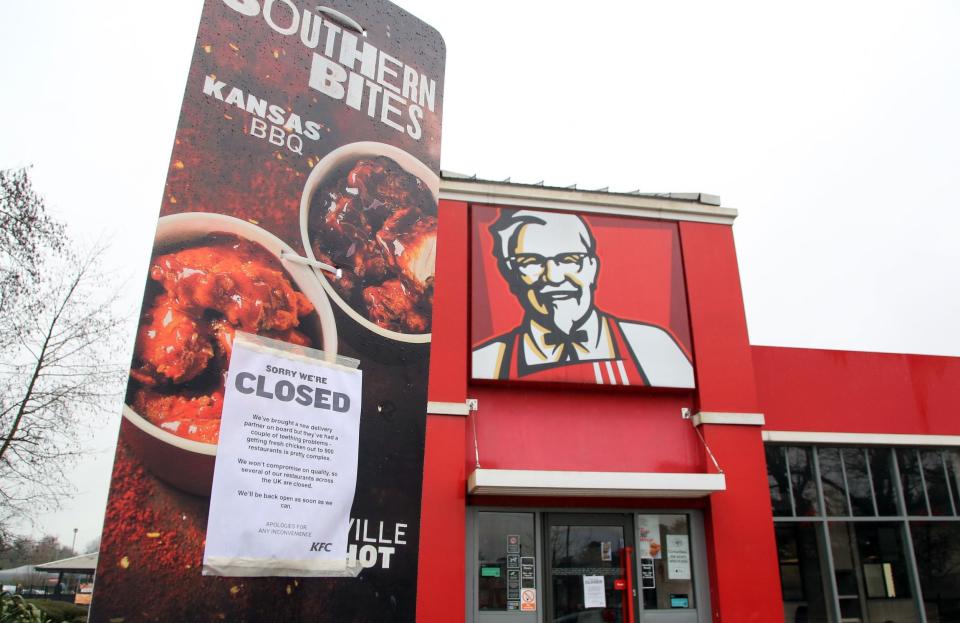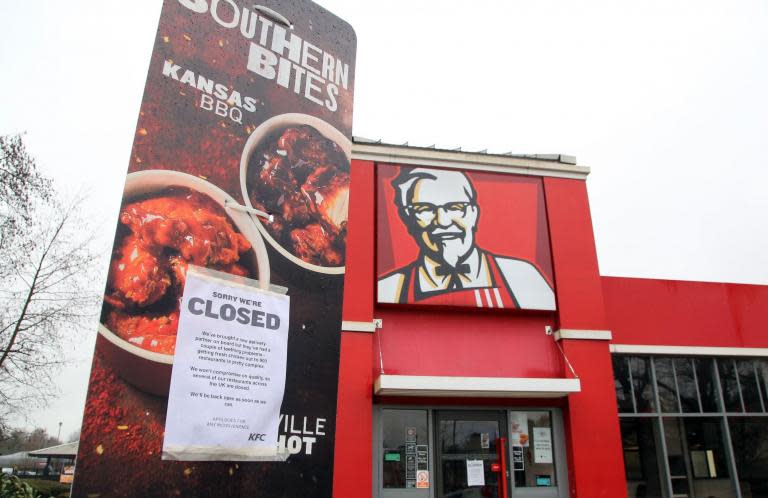Let’s hope the doors of KFC stay closed for good
Fried chicken lovers are in meltdown this week as hundreds of takeaways have run out of bird and closed their doors. Delivery problems meant 646 of KFC’s 900 UK outlets were shut on Tuesday morning.
Fans have flooded social media with amusing memes about how upset they are to be missing out on their regular fix of “finger-lickin good” chicken. Their torment is real.
But if it’s torment you want, take a look at KFC’s track record on animal welfare. In 2015, the BBC’s Billion Dollar Chicken Shop documentary filmed tens of thousands of chickens being squeezed together in dark sheds, stinking with ammonia.
An investigator found some birds were so lame and deformed they could only “drag themselves to the food and water troughs by their wings”, while others “stood motionless, too dazed or dying to move”.
The poor birds live in these windowless sheds for just 35 days before being unceremoniously grabbed by their legs and sent to be gassed, then chopped into nine pieces and shipped to KFC branches. Try and turn that into a funny meme.
Disturbing practices have been found at the chicken giant’s suppliers around the world, everywhere from Germany to New Zealand, India to the US.
In 2004, workers at a West Virginia slaughterhouse were documented tearing the heads off live birds and writing graffiti with their blood. They also spat tobacco into the chickens’ eyes and spray-painted their faces. In one clip, booted workers jumped on live chickens, splashing blood and guts on the lens of the hidden camera.
"I have visited many poultry slaughterhouses, but I have never seen cruelty to chickens to the extent shown on this videotape," said a professor of animal welfare at Cambridge University. Yet the abattoir had proudly won KFC’s “supplier of the year” award.
At a Missouri slaughterhouse, which had won the same award, an investigator found live birds being thrown by workers, boiled alive, and injured by broken transport cages.
Sometimes people who feel guilty when they eat a sheep, a pig or a cow aren’t so worried about eating chicken. They think they’re just silly birds. But experts tell us chickens communicate using complex vocalisations and engage in mathematical reasoning.
They are clever, cheeky and sociable. They form friendships, care for their families, love dust-bathing, nest-building and roosting in trees. These are the sweet beings that are slaughtered and served to you in your bucket.
Even if you put questions of morality to one side, eating chicken is a weird thing to do. Birds are often fed huge amounts of antibiotics to keep them alive, studies have shown that as much as 92 per cent of chicken on sale is contaminated with faecal matter, and food poisoning from poultry makes almost a quarter of a million Brits sick every year.
But it’s a lucrative trade, so fried chicken outlets keep all this suffering and ickiness hidden from you. It’s not just the blend of herbs and spices that are kept secret.
Every day in the UK, 2.5 million chickens are slaughtered for meat – that’s 30 deaths every second. Around 98 per cent were intensively farmed. Many were killed before they had even grown out of the cheeping stage.
Jonathan Safran Foer, in his brilliant book Eating Animals, describes KFC as “arguably the company that has increased the sum total suffering in the world more than any other in history”.
He’s right. I hope the doors of Kentucky Fried Carnage remain closed for good.

 Yahoo News
Yahoo News 

